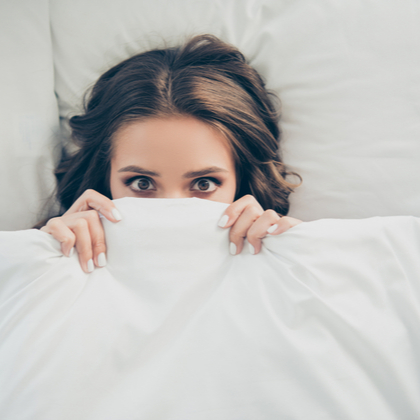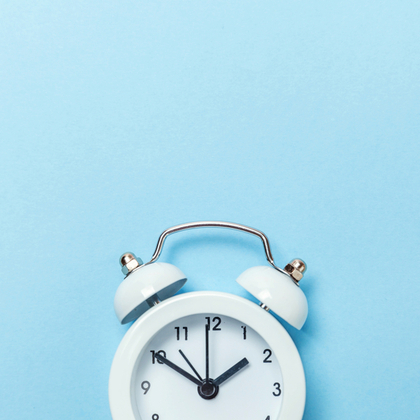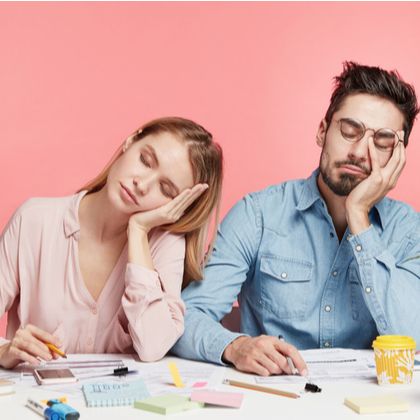
With our ‘always on’ lifestyles, incessant news updates, and the ever-rising cost of living, it’s not surprising many of us struggle to get enough sleep. Shockingly, nearly three-quarters of UK adults fall short of the recommended seven to nine hours of sleep every night, with many scraping by on less than five (1).
Beyond the conventional strategies of improving your sleep hygiene, watching your caffeine intake, and removing electronic devices from your bedroom – all of which promise to help you get more shut-eye – you may be tempted to explore the world of sleep gadgets.
From weighted blankets to blue light-blocking glasses, many products claim to be a magic bullet for sleep. However, with so many options available, it can be hard to know which ones are worth adding to your sleep-health arsenal. Fortunately, we’ve done the hard work for you. Below, we separate fact from fad.
Sleep gadgets for insomnia
Weighted blankets for sleep
A sensory-based intervention, weighted blankets are heavy blankets used for therapeutic purposes. They provide deep pressure stimulation, which may support physical and emotional regulation.
Despite their popularity among adults and children, especially those with neurodivergence, The Royal College of Occupational Therapists suggests they may have little to no effect on sleep (2).
Nevertheless, weighted blankets are also widely used to aid relaxation and promote a sense of calm. And given relaxation contributes to better sleep, dismissing weight blankets entirely might be a little premature.
Our verdict: Ultimately, it comes down to your personal preference and individual needs. There’s no harm in incorporating a weighted blanket into your sleep-health routine, particularly if you struggle with anxiety and find it difficult to unwind before bed.
Pillow spray for sleep
A pillow spray combines distilled water and essential oils to help you de-stress and relax into sleep.
Although specific studies on the effects of pillow sprays on sleep are lacking, there’s abundant and overwhelmingly positive research on the use of certain essential oils, including lavender, chamomile, sweet orange, and rose geranium. So, if your pillow spray includes these soothing fragrances, it might help you sleep better.
From 2011 to 2019, 30 studies explored the relationship between aromatherapy and sleep. A systematic literature review of these concluded that essential oils not only improve sleep quality but also reduce stress, pain, anxiety and low mood – factors that can affect sleep in their own right (3).
Our verdict: Pillow sprays – and aromatherapy in general – are great additions to your sleep health arsenal. For a DIY option, combine 60 ml of distilled water with 12 drops of your favourite essential oil, such as lavender, in a clean, empty spray bottle. A few spritzes should suffice for your pillow, or you could mist the air or your pyjamas.
Aromatherapy diffusers can make your bedroom equally tranquil and relaxing before bed, so you may want to try them, too.
Sleep trackers
The sleep-tracking industry has witnessed significant growth in recent years. From ‘wearables’ – typically in the form of a watch or a ring – to ‘nearables’ – which are placed on or bedside your bed – sleep trackers capture and record body movements to determine time spent sleeping.
Proponents of sleep tracking devices say they can empower you to make positive behavioural changes to support your sleep. For instance, sleep tracking data can reveal how caffeine intake or a large meal before bed can disrupt sleep, reinforcing the benefits of practising good sleep hygiene and helping you stay accountable.
Nevertheless, experts express concern that sleep-tracking technology can be counterproductive (4). These devices can inadvertently lead to ‘orthosomnia’ – a new phenomenon characterised by the obsessive pursuit of optimal sleep, largely driven by sleep data (5). Ironically, a fixation on achieving ‘perfect’ rest can, in fact, create more anxiety and worsen sleep.
Moreover, sleep-tracking data isn’t 100% accurate. Studies suggest devices can detect the basics – when a person is awake or asleep – but they struggle to directly measure shifting sleep stages, such as REM or deep sleep (6).
Our verdict: If you want to gain some insight into your sleeping patterns, exploring sleep tracking could be a worthwhile endeavour. But it’s worth exercising caution if you’re already prone to anxiety or feel anxious when using a sleep-tracking device.
You can read more about sleep trackers here.
Blue light-blocking glasses for sleep
Blue light-blocking glasses are designed to filter out blue light emitted from electronic devices, lights, and other sources.
Exposure to blue light in the evening is known to suppress melatonin, the hormone responsible for governing your sleep-wake cycle (circadian rhythm), which can make it harder to fall asleep. In theory, then, wearing blue light-blocking glasses after dusk may help minimise the negative impact of blue light on sleep.
However, despite a systematic review suggesting blue light-blocking glasses may help individuals with insomnia, researchers still don’t have enough evidence to conclusively state they support overall sleep quality (7).
If you’re looking for a reliable way to reduce blue light exposure before bed, try to avoid screen use as much as possible in the evening, consider leaving your phone outside your bedroom, and turn off all the overhead lights in the hours before sleep.
Our verdict: While more research is needed, blue light-blocking glasses could still be a good addition to your sleep-health routine. However, it’s important to understand these glasses aren’t a substitute for practising good sleep hygiene and reducing light exposure in the evening.
Brown noise for sleep
Brown noise – often likened to an ‘audio blanket’ – has recently gained traction as a potential sleep aid. Unlike the more widely studied white noise – characterised by equal intensity across different frequencies, creating a static-like ‘hissing’ – brown noise has a lower frequency, resulting in a deeper, calmer and more rhythmic sound.
Proponents of brown noise believe it can foster a soothing auditory environment, drowning out background sounds that might otherwise disrupt sleep. For this reason, it can be particularly beneficial for those sensitive to noise or living in busy urban areas. Brown noise may even help reduce stress and promote a sense of calm, which is critical for achieving restful sleep.
Unfortunately, the scientific community has yet to reach a consensus on whether noise therapy can support sleep. A systematic review of 38 studies found limited evidence when investigating similar forms of ambient noise, including white noise (8).
Nonetheless, we can’t ignore the power of the placebo effect. Some avid users of brown noise are convinced it soothes them before bed, which is still significant.
Our verdict: As always, it comes down to your personal preference and curiosity. If you find brown noise therapy works for you, there’s no harm in using it. Just make sure you play it at a safe volume (under 70 decibels) when using dedicated sound machines or apps.
Find out more
If you found this piece on sleep gadgets for insomnia useful, you can delve deeper into similar insights on our dedicated Sleep Health Hub. Alternatively, please get in touch with our team of expert Nutrition Advisors, who are on hand to provide free, confidential advice via email, phone, and Live Chat.
*Subject to cookie consent
References:
-
Sleeping dangerously: 7.5 million Brits have under five hours’ a night. DLG Corporate Website. (2022). [online] Available at: https://www.directlinegroup.co.uk/en/news/brand-news/2022/sleeping-dangerously--7-5-million-brits-have-under-five-hours--a.html.
-
RCOT launches official weighted blankets guide for occupational therapists. RCOT. (2023). [online] Available at: https://www.rcot.co.uk/news/rcot-launches-official-weighted-blankets-guide-occupational-therapists.
-
Effect of aromatherapy on sleep quality of adults and elderly people: A systematic literature review and meta-analysis. Her J, Cho MK. (2021) Complement Ther Med. 60:102739.
-
How Does Sleep Tracking Influence Your Life? Kuosmanen, E., Visuri, A., Kheirinejad, S., van Berkel, N., Koskimäki, H., Ferreira, D. and Hosio, S. (2022). Proceedings of the ACM on Human-Computer Interaction, 6(MHCI), 1–19.
-
Orthosomnia: Are some patients taking the quantified self too far? Baron, K. G., Abbott, S., Jao, N., Manalo, N., & Mullen, R. (2017). Journal of Clinical Sleep Medicine, 13(2), 351–354.
-
Performance of Four Commercial Wearable Sleep-Tracking Devices Tested Under Unrestricted Conditions at Home in Healthy Young Adults. Chinoy ED, Cuellar JA, Jameson JT, Markwald RR. (2022) Nat Sci Sleep. 14:493-516.
-
Evening wear of blue-blocking glasses for sleep and mood disorders: a systematic review. Hester L, Dang D, Barker CJ, Heath M, Mesiya S, Tienabeso T, Watson K. (2021) Chronobiol Int. 38(10):1375-1383.
-
Noise as a sleep aid: A systematic review. Riedy, S.M., Smith, M.G., Rocha, S. and Basner, M. (2021). Sleep Medicine Reviews, [online] 55, 101385.
Related Posts

Do I Have Symptoms Of Insomnia Or Just Trouble Sleeping?

Insomnia Treatments: Natural Remedies To Help You Fall Asleep

Why Am I Always Tired? Signs Of Poor Sleep Hygiene Explained

Olivia
Olivia Salter has always been an avid health nut. After graduating from the University of Bristol, she began working for a nutritional consultancy where she discovered her passion for all things wellness-related. There, she executed much of the company’s content marketing strategy and found her niche in health writing, publishing articles in Women’s Health, Mind Body Green, Thrive and Psychologies.
View More
